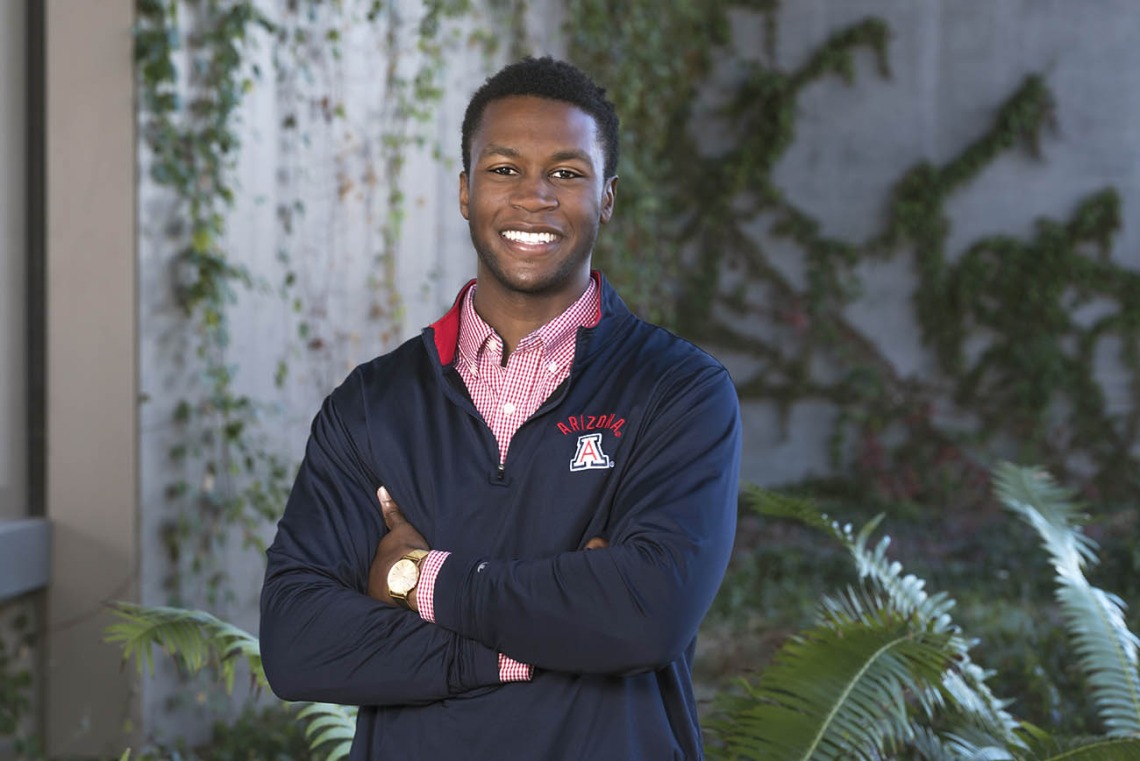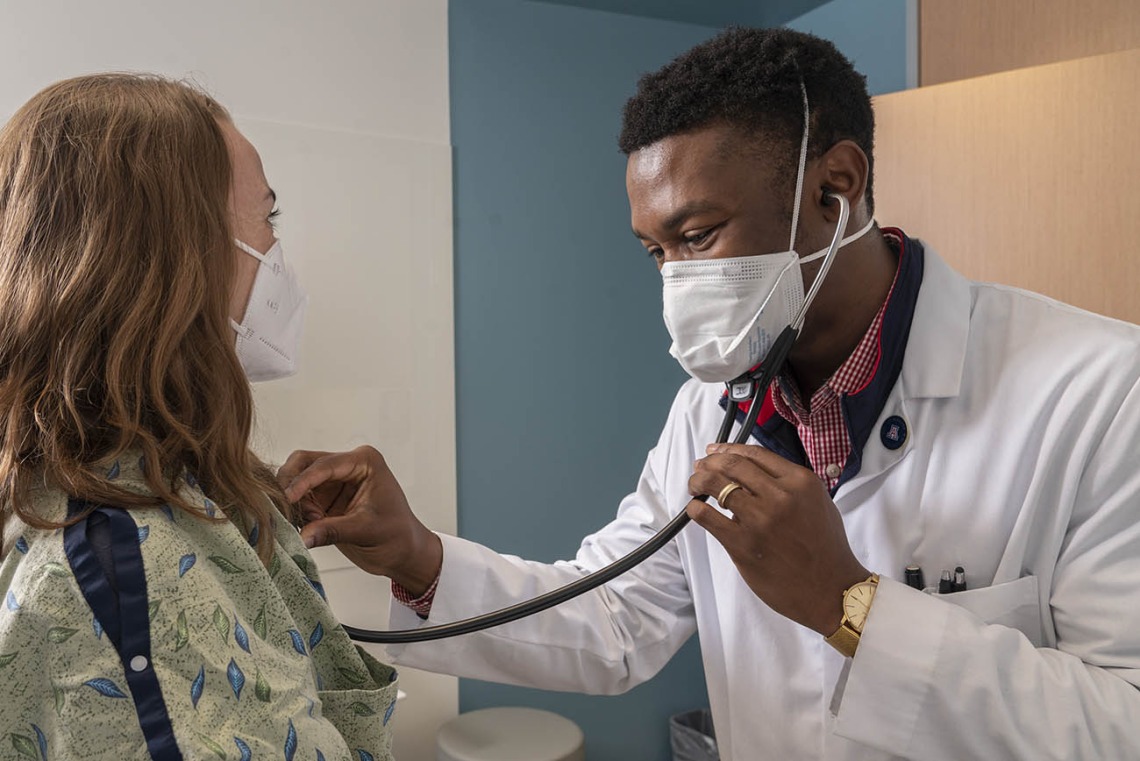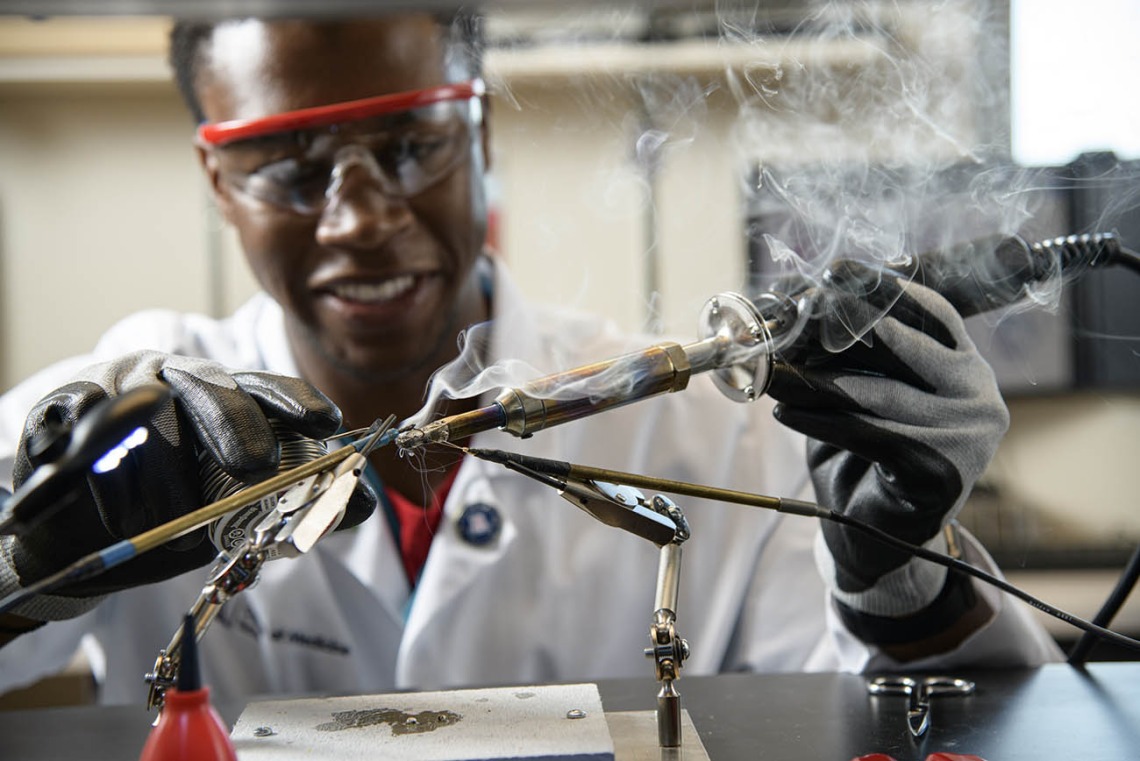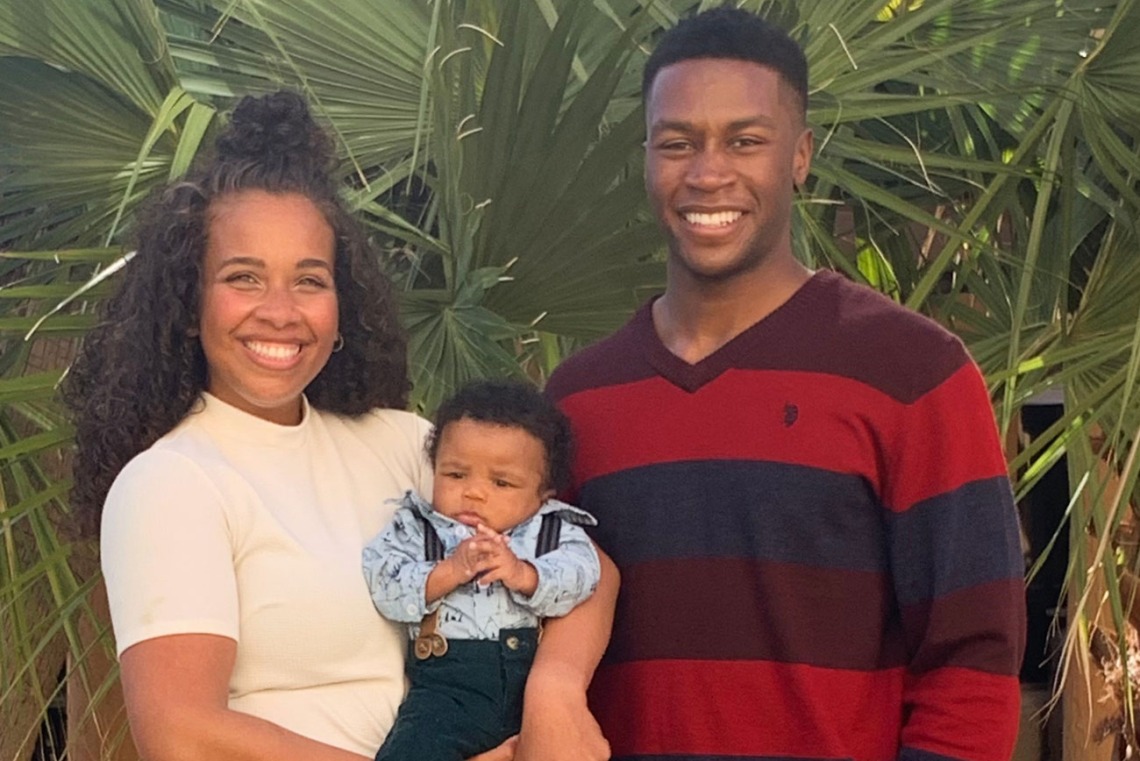Meet an Aspiring Cardiologist Targeting Heart Disease Through Research and Innovation
As Ike Chinyere, PhD, a University of Arizona College of Medicine – Tucson third-year medical student, breaks it down, biomedical research, clinical care and entrepreneurship fit together naturally.

Physicians practicing medicine are trained to care for patients with the assistance of cutting-edge technology and evidence-based guidelines for their use.
These guidelines often originate from rigorously designed basic science followed by clinical trials, meaning someone was creative enough to search for a better answer and bold enough to act on that innovation. One day I hope to be such a person.
I am currently in my final year of the National Institutes of Health-funded MD-PhD program at the University of Arizona College of Medicine – Tucson. I recently completed my doctorate in cardiac electrophysiology where I studied ventricular tachyarrhythmias in pre-clinical models of heart failure. My goal is to become a cardiovascular physician-scientist.
When I envision what I want to achieve professionally, I recall how many of my mentors’ careers culminated: bench-to-bedside research and implementation. Specifically, they leveraged their resourceful scientific “toolbox” to pursue hypothesis-driven investigation, file relevant intellectual property with the help of Tech Launch Arizona and publish their findings for the scientific community to review.
Outside of the lab, the work continues with team-based medical decision-making, technical procedures and patient communication. In addition, clinical work can include working with the Food and Drug Administration to utilize emergency use investigational drugs and biologics, acquire compassionate use indications, and execute clinical trials.
I believe that it is my calling to simultaneously employ all of these skillsets to make a difference in patients’ lives and the health care system.
Curiosity drives me as a medical student and entrepreneur
I believe entrepreneurship fits into how I approach my goals as a physician-scientist in training.
From my view of the world, entrepreneurship is a synonym for problem-solving. And a privilege of holding a Medical Doctor degree is the opportunity to help solve health care problems.
You have an idea triggered by patient care – something that could make a difference in the patient’s outcome, lifespan or quality of life. You come up with a series of controlled experiments to validate or refute that hypothesis. And you keep adjusting and moving forward, working with a multidisciplinary team to figure out how to ultimately implement that idea.

Dr. Chinyere is a third-year medical student at the University of Arizona
I’ve been fortunate enough to participate on such a multidisciplinary team and contribute to intellectual property that is protected by several patents. I’ve had the opportunity to serve as a consultant for Tucson-based medical device companies and even won a student entrepreneurship award from the Phoenix-based business incubator BioAccel.
During my doctoral studies, I was grateful to work as an Entrepreneurial Fellow with Tech Launch Arizona. This opportunity provided me additional insight into the academic entrepreneurship process and the many connections that are made throughout the city, state and nation. I was paired with a mentor-in-residence and observed how startups progress to acquisition-ready entities and all of the decision-making that needs to be done at each step.
Equally interesting are the challenges associated with being in a dual-degree program and working at the intersections of medicine, science and entrepreneurship.
As physician-scientists, we don’t fit perfectly into either world. There are people who say we need more clinical training; others might argue we’re not focused enough in our research. It can be a bit disorienting, but I’ve found that what is most important is to maintain the curiosity and passion that drives you forward.
Why cardiology and the heart’s ‘circuits’
Curiosity is really what keeps me focused on my research, and I’d like to think that my brain works better when I’m thinking about the heart.
I want to specialize in electrophysiology, a subspecialty of cardiology that focuses on the electrical properties of the heart. This includes diagnosing and treating arrhythmias, or irregular heart rhythms, using highly specialized devices and procedures.

Dr. Chinyere studied cardiac electrophysiology at the University of Arizona
For my doctoral work, I focused on novel surgical biomaterial interventions to treat heart arrhythmias. Biomaterials are synthetic or naturally occurring materials that can be used as biomedical devices to assist, replace or change a wide variety of biological functions, from pacemaker systems to tooth fillings.
Ultimately, I hope my research experience will bolster my understanding of the heart’s ‘circuits’ and help me more easily recognize opportunities for new techniques, interventions and therapies as I continue my medical training.
In order to fulfill my purpose and facilitate change, I believe it is necessary for me to understand the whole system, from the specific details of cardiac electrophysiology to the expansive practice of internal medicine and even bedside manner with patients.
Resistance and doubt, followed by eagerness and success
My parents emigrated from Nigeria and settled in northern Arizona before I was born. My father is a practicing clinical and retail pharmacist and my mother a registered nurse, but I wasn’t originally interested in health care.
Ironically, I was doing everything in my power to not go into medicine or follow in my parents’ footsteps.
In high school, I was encouraged to consider mechanical engineering because of my performance in calculus. But as I looked into the profession and visited colleges across the country, I didn't believe the lifestyle would fit me. I realized that I preferred anatomy and physiology classes. Interactions with current students in the American Physician Scientists Association gave me insight into the short-term and long-term value of the dual-degree training.
Shadowing a cardiologist in my hometown served as the final piece of the puzzle. Seeing the day-to-day doctor-patient interactions helped confirm my interest in pursuing medicine at the University at Arizona Health Sciences.
Looking back, I have no regrets.
I graduated Summa Cum Laude with Honors as a physiology major and went straight into the dual-degree program at the UArizona College of Medicine – Tucson.
Guidance from faculty at the UArizona Sarver Heart Center throughout my undergraduate and graduate studies helped me advance my scientific career and mature my passion for cardiology. I am indebted to Drs. Steven Goldman and Elizabeth Juneman, as well as too many others to name, for taking me under their wings and giving me opportunities to be successful.
Ready for my next chapter as a future cardiologist
Right now, my days are filled with clinical training, practicing making medical decisions and diligently taking patient notes in electronic health records. When I’m not studying, you might find me at the gym, occasionally playing basketball or powerlifting, or spending time with my wife (also a University of Arizona alum) and our son. Connection with friends, family and my church keep me grounded and balanced.

Dr. Chinyere with his wife and son
I intend on pursuing residency, fellowship and subspecialty training after I complete my MD in May 2023. I’ve already initiated the process of applying to multiple institutions across the country, and I have my sights set on a special type of program where I can pursue internal medicine, cardiology and clinical cardiac electrophysiology, with protected time for postdoctoral research investigation.
I'm excited for this next chapter, when it will be time for me to put all I’ve learned into practice. Keep an eye out, maybe you’ll see me in a hospital or clinic near you!
About the Author
Ike Chinyere, PhD, is a medical student in the National Institutes of Health-funded MD-PhD program at the University of Arizona College of Medicine – Tucson. He recently completed his doctorate in cardiac electrophysiology where he studied ventricular tachyarrhythmias in pre-clinical models of heart failure. His goal is to become a cardiovascular physician-scientist.

